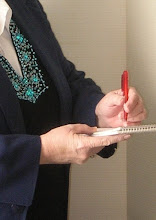Question 3 –continued
The distinction about who is causing the problem is imperative since lawmakers need accurate information upon which to base their support or their votes. Senate analyst Mandy O’Callaghan said in an interview that Florida West Coast Locksmith Association (FWCLA) and Associated Locksmiths Of America (ALOA) presented committee members with a booklet of news articles as documentation of “locksmith misconduct.” When I asked O’Callaghan if the misconduct were by professional locksmiths or call center employees posing as locksmiths, she said she wasn’t sure, but thought it was both.
In the March 3, 2010 hearing in front of the Agriculture & Natural Resources Policy Committee, Rep. Thomas Anderson, House sponsor of the bill, can be seen holding up the booklet and referring to it. (Video archives are no longer available, but audio podcasts are. See link below.)
“The locksmith industry has shared with me many examples of excessive charges and questionable practices by various locksmiths” said Anderson, “and is in agreement with this bill and actually the bill is being brought forward on behalf of the locksmith industry. It’s not something that I dreamt up. It’s something that the industry feels is needed and would like to have passed.”
Anderson then holds up the booklet, “I have a booklet here and I think most of you have seen this booklet. It is a listing of newspaper articles and magazine articles on the issue of theft, abuse and fraud in the locksmith industry. Now most recently, the current issue of Women’s Day magazine highlights ‘Scam Alert.’"
Anderson begins reading the article, “I recently called a local locksmith and ended up talking to a call center in Kansas and I live in Oregon. Scam companies will pile phone books with similar names however they are centrally located in other states.”
“Not only do they overcharge,” Anderson emphasized, “but they send out inexperienced locksmiths who now know how to get into your home.”
“Excessive charges and questionable practices by various locksmiths?” “Inexperienced locksmiths?” Could these possibly be unprofessional “locksmith” scammers Rep. Anderson is referring to?
Rep. Anderson doesn’t seem to be able to distinguish between the professional locksmith and the phony based on the information he’s been given. When you watch the video of the proceeding, it’s obvious that no proponents of the bill, sitting in close proximity to Rep. Anderson, attempted to clear up his misconception. Bobble-head FWCLA lobbyist Janet Mabry sat on the front row behind the podium where Anderson spoke, and where FWCLA Treasurer Ken Kupferman later spoke, and continually nodded her head in agreement.
This huge misconception is upon what most committee members would base their vote. Kupferman did not take the opportunity when he spoke to correct what had been said.
The booklet was just a print off of the 201 news stories on ALOA’s website. Associations of criminal elements to Florida’s professional locksmiths by FWCLA and ALOA were intentional and shameful.
So, the accurate answer to Question #3, (according to the documentation ALOA provided) is NONE. There was NO documented evidence of harm done to the Florida public by Florida’s professional locksmiths presented.
Locksmiths are regulated and information about them can be accessed online
Consumers can check local city or county websites to see if locksmiths are complying with local regulations by having a valid occupational license or business tax receipt. Consumers can also go to local associations websites to investigate local professional locksmiths and can call or go to county consumer protection agencies’ websites to see who complaints have been filed against.
Locksmiths are also self-regulated concerning training through their local associations. Training sessions are open to members and non-members alike.
As for unregulated “locksmith” scammers, they are criminals and it is difficult to “regulate” criminals until after they’ve been caught. They can and have been stopped in Florida by enforcing anti-fraud laws already on the books.
Questions 4 & 5 combined
Provide a list of states that regulate the profession (Question 4) and a list and description of state and federal laws that have been enacted to protect the public with respect to the profession or occupation and a statement of the reasons why these laws have not proven adequate to protect the public (Question 5):
Only ALOA answered: After listing 15 states with locksmith laws (and their websites), ALOA lists Connecticut, Nevada and Nebraska as having locksmith registration laws but writes “they have no enforcement mechanism except for lack of being registered.” I’m assuming only ALOA answered this question since FWCLA is Florida-based and not involved in other states’ legislation as is ALOA.
Inaccurate: In reading the laws in these three states, as in the other 12 states, if a locksmith is not registered, they will hear from the state or county authorities or law enforcement and suffer penalties such as fines, suspension, revocation or non-renewal of their license or registration. For those not registered who pose as locksmiths, the anti-fraud laws apply and they have been used successfully.
The other 12 states require something these three states lack -- mandatory and continuing testing and education. Apparently, this is the “enforcement mechanism,” that ALOA seeks.
Questions 6
Provide a description of the voluntary efforts made by members of the profession or occupation to protect the public and a statement of the reasons why these efforts are not adequate to protect the public:
Only ALOA answered: “ALOA has a grievance procedure, where they (we) can remove violators of the Code of Ethics from our rolls, but it only applies to members.”
Accurate: Short and sweet, but neglected to mention all the things Florida locksmiths have done to protect the public and why these efforts are working. See answer in Question 8. Local locksmith associations have their own grievance procedures as well and they, too, are limited to their members.
Neglected: Strange . . .FWCLA didn’t even mention their consumer warning page on their own website which makes me wonder just who filled out this questionnaire. Nor did they mention any of the consumer warnings on other locksmith association websites or the consumer warnings on most every legitimate locksmith’s website.
Question 7
Provide a copy of any federal legislation mandating regulation:
Answer: The Federal Non-Mailability Act (see attached).
Accurate: This relates to certain locksmithing devices such as bump keys prohibited from being mailed except by those within the locksmith community.
Question 8
Provide an explanation of the reasons why other types of less restrictive regulation would not effectively protect the public:
Only ALOA answered: ALOA refers back to their answer to Question 6 concerning “no enforcement mechanism except for lack of being registered.” They also conclude “if a registered locksmith harms the public, there is no recourse.”
Inaccurate: As long as Florida has attorneys, there is recourse against professional locksmiths (those professionally-trained Florida locksmiths who actively acquire skills and training to enhance his/her service and livelihood). As long as Florida has anti-fraud laws on the books, there is recourse against locksmith scammers. Scammers are criminals. Criminals can’t be “regulated” until they are caught. The public does not need to beware of professional locksmiths. Consumers have several agencies at the state and local levels where they can file a complaint. See links below.
ALOA neglected to mention all that Florida locksmiths are successfully doing:
Professional locksmiths have been voluntarily getting the word out about scammers to their customers whether verbally, by flyers, on their websites and blogs. They have threatened to pull their advertising from phone directories and Internet search engines if these providers don’t get rid of the scammers and it is working. Florida locksmiths educate the public at every chance and have not been waiting for the government to solve this problem for them.
Question 9
Provide the cost, availability and appropriateness of training and examination requirements:
Only ALOA answered: ALOA states that they have a nationally recognized training and testing program to sell to states at a nominal fee and it could be adjusted to meet each state’s needs.
Accurate, but neglected to mention: According to ALOA’s July 2009 Keynotes magazine, ALOA derived almost 50 percent of their income (more than $1 million) from their multi-day, all-day training conventions and educational programs.
That same year they took in $836,762 from memberships -- a decline from the prior year. The $836,762, by the way, accounts for 4,291 members each paying $195 annually or 5,071 paying $165 each since $30 goes to a legislative assessment fee. Kupferman had stated in a prior interview that the organization had 8,000 – 9,000 members. (See story in Locksmith Investigator link below.)
Since ALOA initiated this bill through its former president and former affiliate, it probably seems appropriate to them to influence locksmith legislation in various states, including Florida, to include mandatory testing and continuing education for their benefit.
As national policy analyst John Berlau said, “they (ALOA) shouldn’t use the power of big government to both coerce locksmiths and consumers into their cartel and fill their coffers.” See Berlau’s comments below in the Locksmith Investigator article entitled, “National policy expert gives pending Florida locksmith law a thumbs down.”
Tomorrow: The final installment of this report reveals facts that FWCLA and ALOA failed to mention, reveals what other state agencies have stated about the problem and more about the proponents of the bill.
DOCUMENTATION
Podcast of March 3, 2010 – Agriculture & Natural Resources Committee
(Video is no longer archived but audio is in the form of a podcast)
www.myfloridahouse.gov/Sections/PodCasts/PodCasts.aspx Scroll down to the Committee’s March 3 podcast. You can also scroll down to the March 22 podcast of the Public Safety & Domestic Security Policy Committee and hear Anderson repeat the same speech.
See Consumer Warning pages
Central Florida Locksmith Association www.cflalocksmith.org
First Coast Locksmith Association www.fcla.net
Florida West Coast Locksmith Association www.fwcla.org
FWCLA listed on ALOA’s June 2003 website as an affiliate: http://web.archive.org/web/20030206051953/http://www.aloa.org/about/chapter.htm#aloa"
Associated Locksmiths of America www.aloa.org
ALOA’s Keynotes magazine – July 2009
https://docs.google.com/fileview?id=0B0C_xUBqIBkhYjE5ZTdiNWMtYzRjZi00M2ZkLWIzMDUtM2IxMzE1MDBhN2Nl&hl=en"
Janet Mabry’s appearance sign in
www.myfloridahouse.gov/Sections/Documents/loaddoc.aspx?PublicationType=Committees&CommitteeId=2470&Session=2010&DocumentType=Action Packets&FileName=ANRPC_ACTN_3_3_2010.pdf
This link is very long, so go to www.myfloridahouse.gov, then select committees and scroll down to “General Government Policy Council.” From there select the Agriculture & Natural Resources Policy Committee. Once on their page, select “All Council and Committee Documents” from the Committee Document section and select the March 3rd Action Packet. Page 5 lists Janet Mabry signing in as a lobbyist for Florida Locksmith Association.
Podcast of March 3, 2010 – Agriculture & Natural Resources Committee
(Video is no longer archived but audio is in the form of a podcast)
www.myfloridahouse.gov/Sections/PodCasts/PodCasts.aspx Scroll down to the Committee’s March 3 podcast. You can also scroll down to the March 22 podcast of the Public Safety & Domestic Security Policy Committee and hear Mabry state she is at the meeting to represent “Florida locksmiths.”
Locksmith Investigator news articles
“National Locksmith Association changes ethics code – almost.”
http://locksmithinvestigator.blogspot.com/2009/04/locksmith-association-clarifies-ethics.html
“National policy expert gives pending Florida locksmith law a thumbs down.”
http://locksmithinvestigator.blogspot.com/2010/03/national-policy-expert-gives-pending.html
Subscribe to:
Post Comments (Atom)


No comments:
Post a Comment